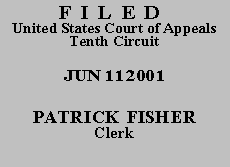

| STEPHEN SIMON, individually and
as ultimate assignee of Humanistic
Mental Health Foundation,
Plaintiff-Appellant, v. CYPRUS AMAX MINERALS HEALTH CARE PLAN; CHRIS CROWL, individually and as Plan Administrator, Defendants-Appellees. |
|
Plaintiff Stephen Simon appeals the district court's order dismissing his claims brought pursuant to the civil enforcement provision of the Employee Retirement Income Security Act (ERISA), 29 U.S.C. § 1132(a).(1) We exercise jurisdiction under 28 U.S.C. § 1291 and affirm.
Plaintiff sued on his own behalf and as the assignee of Humanistic Mental Health Foundation (Humanistic), which had provided medical services to an individual referred as "J.W." Plaintiff sought to recover money from defendants, who are an ERISA health insurance plan and its administrator, for the medical services provided to J.W. J.W. had assigned his claim for benefits to Humanistic, which in turn, had assigned the claim to plaintiff. The district court determined that plaintiff lacked standing to bring an ERISA action, and dismissed the case for failure to state a claim, pursuant to Fed. R. Civ. P. 12(b)(6).
As a preliminary matter, we address defendants' motion to dismiss this appeal on the ground that plaintiff's appellate brief was filed late. Plaintiff served his brief within the time allotted by this court's letter dated October 18, 2000. Under the circumstances, we will consider the merits, rather than dismiss because of "minor technical defects." See Denver & Rio Grande W. R.R. v. Union Pac. R.R., 119 F.3d 847, 848 (10th Cir. 1997).
Turning to the merits, we review de novo an order dismissing a complaint for failure to state a claim for relief under Rule 12(b)(6) of the Federal Rules of Civil Procedure, using the same standard applied by the district court. See Ordinance 59 Ass'n v. United States Dep't of Interior Sec'y, 163 F.3d 1150, 1152 (10th Cir. 1998). "We accept as true all well-pleaded facts, as distinguished from conclusory allegations, and view those facts in the light most favorable to the nonmoving party." Maher v. Durango Metals, Inc., 144 F.3d 1302, 1304 (10th Cir. 1998). Dismissal of a complaint pursuant to Rule 12(b)(6) will be upheld only if "it appears beyond doubt that the plaintiff can prove no set of facts in support of his claim which would entitle him to relief." Conley v. Gibson, 355 U.S. 41, 45-46 (1957).
Plaintiff asserts that he has standing to sue under ERISA's civil enforcement provision, 29 U.S.C. § 1132(a). "[T]he standing question . . . is whether the . . . statutory provision on which the claim rests properly can be understood as granting persons in the plaintiff's position a right to judicial relief." Warth v. Seldin, 422 U.S. 490, 500 (1975) (footnote omitted). Under § 1132(a), an action may be brought by a participant, a beneficiary, the Secretary of Labor, a fiduciary, or under limited circumstances, a State or employer. § 1132(a). Plaintiff claims he has standing as, or through, a beneficiary. ERISA defines a "beneficiary" as "a person designated by a participant . . . who is or may become entitled to a benefit" under an employee benefit plan. 29 U.S.C. § 1002(8). A "participant" is defined as "any employee or former employee . . . who is or may become eligible to receive a benefit of any type from an employee benefit plan . . . ." Id. § 1002(7). Under the facts before us, J.W. is an ERISA "participant."
Plaintiff does not qualify as a "beneficiary" because he was not "designated by a participant." Rather, he is the assignee of an assignee of a participant.
"ERISA carefully enumerates the parties entitled to seek relief under [§ 1132(a)] . . . ." Franchise Tax Bd. v. Constr. Laborers Vacation Trust, 463 U.S. 1, 27 (1983). The remedial provisions are part of a "comprehensive and reticulated statute." Nachman Corp. v. Pension Benefit Guar. Corp., 446 U.S. 359, 361 (1980). ERISA's enforcement provisions, "crafted with such evident care," indicate that Congress intended to limit the available remedies to those included in the statute. Mass. Mut. Life Ins. Co. v. Russell, 473 U.S. 134, 145, 147 (1985). Plaintiff has not established that Congress intended to grant an ERISA remedy to an assignee of an assignee of a plan participant. Accordingly, we decline to expand the remedial and enforcement provisions. Because plaintiff does not qualify as a party entitled to the ERISA civil enforcement provisions, he does not have standing to bring this action. Therefore, the district court's dismissal was correct. Other jurisdictions have also rejected on the same basis similar claims brought by plaintiff. Simon v. Value Behavioral Health, Inc., 208 F.3d 1073, 1081 (9th Cir. 2000), cert. denied, 121 S. Ct. 843 (2001); Simon v. Belwith Int'l, Inc., No. 00-1680, 2001 WL 111651, at *1 (6th Cir. Jan. 31, 2001) (unpublished); Simon v. Quaker Oats Employee Benefit Plan, No. 00-2342, 2000 WL 1657967, at *1 (7th Cir. Nov. 1, 2000) (unpublished), petition for cert. filed, (U.S. Feb. 26, 2001) (No. 00-1650).
Plaintiff complains that the district court did not grant him an opportunity to amend his complaint. The record reflects that he did not request such an opportunity. Therefore, no error occurred.
Defendants' motion to dismiss and motion for sanctions are denied. Plaintiff's requests for oral argument and an initial en banc hearing are denied. The judgment of the United States District Court for the District of Colorado is AFFIRMED. The mandate shall issue forthwith.
Entered for the Court
Circuit Judge
*. This order and judgment is not binding precedent, except under the doctrines of law of the case, res judicata, and collateral estoppel. The court generally disfavors the citation of orders and judgments; nevertheless, an order and judgment may be cited under the terms and conditions of 10th Cir. R. 36.3.
1. Plaintiff refers in his appellate brief to state law, constitutional, and civil rights claims. Although his complaint mentions these claims, they are not supported by well-pleaded factual contentions and do not withstand dismissal. See Hall v. Bellmon, 935 F.2d 1106, 1110 (10th Cir. 1991).